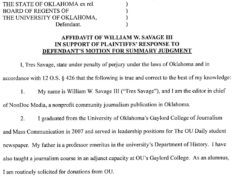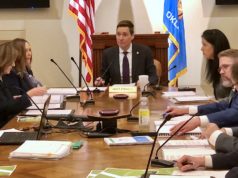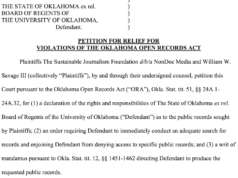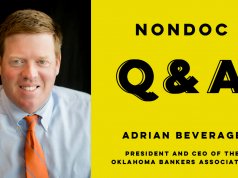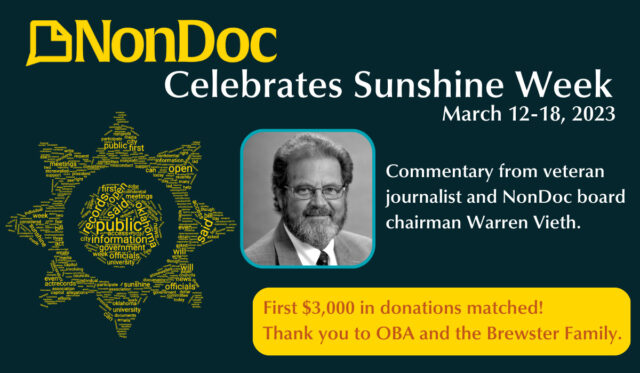
When I took a State Capitol reporting class at the University of Oklahoma in 1977, I was assigned to write a weekly news report for the Grove Sun. The House member who represented Grove was Wiley Sparkman, a good-hearted but curmudgeonly lawmaker with a reputation for hard living and blunt talk.
In one of our first encounters, I asked Sparkman how he had voted in committee on a bill I thought would be of interest to newspaper readers in Grove.
“I’m not going to tell you,” Sparkman said.
“Why not?” I asked.
“Because I’m the legislator, and you’re the paper boy.”
Fortunately, it was easy enough in those pre-internet days to obtain vote readouts from committee chairs and bill authors. But the exchange with Sparkman made it clear to me that if it were left to the discretion of individual elected officials or appointed agency heads, some information about the workings of government might never see the light of day.
Making sure it does see daylight is the mission of Sunshine Week, a nationwide observance that began Sunday. Its purpose is to promote open government at all levels, from tiny village councils to massive federal agencies.
NonDoc Media is pleased to participate in Sunshine Week, and we are excited to announce that the first $3,000 we raise this month will be matched dollar for dollar. The Oklahoma Bankers Association and family members of the late Congressman Bill K. Brewster have made pledges to support our work — if we can hit our $3,000 goal.
Will you check out our new online donation system and donate to NonDoc today?
‘Stonewalled by records custodians’
In Oklahoma, public oversight of government is guaranteed by the Open Records Act, the Open Meeting Act and public notice provisions contained in other statutes. Yet NonDoc and other news organizations often encounter obstacles in our efforts to obtain information, from outright denials to questionable delays, redactions and other difficulties.
In 2021, NonDoc Media and its editor-in-chief, Tres Savage, sued the OU Board of Regents after the university refused NonDoc’s request for two reports about financial misconduct and sexual misconduct allegations involving former OU President David Boren. Even though OU paid a multinational law firm more than $1 million to conduct the investigations, the university said the documents should be considered confidential under the Open Records Act. The suit is pending in Cleveland County District Court.
More recently, the City of Edmond denied NonDoc reporter Joe Tomlinson’s request for copies of emails involving allegations of racism, sexism and workplace bullying by a deputy police chief. The city, like OU, said it considered the documents to be confidential. Unbeknownst to the city at first, Tomlinson had received the emails from another source, enabling him to write the story despite the city’s refusal.
Mark Thomas, executive vice president of the Oklahoma Press Association, has spent nearly three decades representing editors and publishers at the Capitol. Although conflicts between journalists and public officials over information access have been a perennial tug of war, two big trends have “changed the game” in the last three to five years, he told me recently.
First, incidents of civil unrest fueled by political polarization have caused many public officials and government employees to fear for their safety. That, in turn, has led to legislative efforts to remove more and more information from the public record.
“People have become more afraid and suspicious of everyone else,” Thomas said.
Second, fear of COVID-19 transmission led to a loosening of restrictions on how open meetings can be conducted. Many boards, councils and commissions now routinely hold meetings by videoconference, even though the pandemic is widely viewed as less of a threat. Thomas is negotiating with lawmakers this session over legislation to require most meetings to be held in public venues, even if some officials participate via Zoom.
Thomas said he remains optimistic that the bedrock requirements governing public access in Oklahoma will remain secure.
“When you get stonewalled by records custodians because they just don’t want to give you the records, there are still those kinds of problems,” he said. “But thousands of records requests are fulfilled every day, so something’s working right.”
Ensuring that it continues to work right is what Sunshine Week is all about. To help NonDoc do its part to preserve public access to information, please consider donating so we can take advantage of $3,000 in matching funds available to our organization. NonDoc is a nonprofit news publication, so it depends mainly on foundation grants, charitable sponsorships and individual contributions to stay in business. So do our nonprofit colleagues such as Oklahoma Watch and The Frontier.
Your support will help ensure that the “paper boys” of today continue to represent your interests far into the future.










